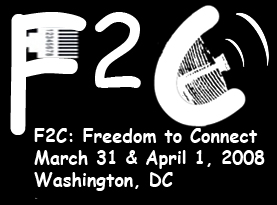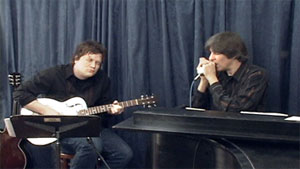Wednesday, December 26, 2007
How I did at predicting 2007
[Unfortunately, the TED videos seem to make all three of the browsers on my MacBook -- Firefox, Safari and Internet Explorer -- crash. But it's a small price to pay because every TED video I've watched has been worth restarting my browser . . . and more!]
Skeptical readers might say that I'm a geek, therefore not representative of the general public on matters of technology adoption. Actually, I'm not. I'm "early majority" not "bleeding edge" so when I'm doing something regularly, you can be fairly sure it is real.
I actually do think 2007 was the knee in the curve for on-line video. So I got it half right. Or less -- we should subtract a few points because anybody with eyes could have seen it coming in 1/07.
Tuesday, December 25, 2007
Pic > 1kword

This is the ClustrMap for Ethan Zuckerman's blog. Ethan is co-founder of Global Voices . . . can you tell?
Saturday, December 22, 2007
Climate change for skeptical environmentalists
This video has had over 2.9 million views already. Nice.
[Update: URLs for video updated 8/18/08.]
Now that you've seen it (Go ahead, watch it) imagine the same argument laid out in a written essay. As compelling? No way. As easily accessible by millions of people? Not. The medium is the message. Barriers to videos that would raise the threshold for little gems like this would be socially irresponsible.
Thanks to Jock Gill at Greater Democracy for this pointer.
Technorati Tags: AlGore, ClimateChange, GlobalWarming, NetworkNeutrality, Press
Thursday, December 20, 2007
Another confused anti-Neutrality Op-Ed
The article ridiculously recasts Comcast's recent interference with peer-to-peer traffic, in which an Associated Press reporter caught Comcast forging "reset" packets to disrupt transmissions from such applications as Bittorrent and Lotus Notes, as "a very good reporter's innocent mistake." There was no mistake. Comcast was blocking its customers traffic based on the kind of traffic it was. (Further, Comcast never admitted doing it despite the red-handed evidence, and never renounced it. As far as we know, they're still doing it.)
The supposed mistake was that the AP reporter did not wait long enough. The Op-Ed says, "Had the reporter simply waited, the file would have arrived unadulterated once the bandwidth became available." Aha! Arrival time does not matter. What do we need the Internet for? Why not send the file by pony express?
The sentence above has another red herring, "once the bandwidth became available." This is complete nonsense. The bandwidth was available -- indeed, Comcast was sending its forged bogus signals over said precious bandwidth.
The heart of Yates Rivers rhetoric is the conflation of connection and application. She writes, "There's nothing objectionable about [application] management as long as providers do so in a content-agnostic manner." But, "content-agnostic" means more than, e.g., don't favor Mitt over Rudy. Blocking certain applications while favoring others is itself a violation of content agnosticism. Bittorrent is currently the best way to deliver Internet video content. Was Comcast blocking Bittorrent to keep Internet video competition with cable TV at bay? The medium is the message.
It was much simpler back a few years ago when the Internet had to be stupid, that is, when computation was so scarce that you couldn't do deep packet inspection at wire speeds. That little hiatus was when the Internet matured and proved that a network that would just deliver the packets was a fertile innovation environment indeed.
Today, simple is still better. If our Internet connection were a simple Ethernet interface, it'd cost about $15 per household. But what we get from the telco (or cableco) is an interface that supports telephony, TV and Internet. It costs ten times more. And when you start snooping into the Internet packets themselves, network complexity (hence infrastructure cost) goes up even more.
Andrew Odlyzko, in work that is at least a decade old, showed that most Internet resources are way over-provisioned, and that congestion virtually always comes from a single overloaded node or facility. As far as we know, this is still true. Where there is a spot overload, it is cheaper to simply add capacity than it is to manage the packets and what's in them.
Another fact: It is approximately as cheap to implement a Gigabit link as a 56 kbit link. Despite the 18,000-fold increase in speed, most of the cost is in the right of way, the wire (or fiber), the power supply, the network-facing interface, the customer-facing interface and the modulation/demodulation logic. How fast the algorithms run is a trivial cost in the overall system. Indeed we have the **technology** to never be bandwidth limited ever again. And the technology is affordable. We could put Gigabit fiber Internet access into every household in the USA for about three Iraq-budget-months.
So mostly Yates Rivers is wrong when she says that bandwidth is finite. Where it is finite, the blame lies at the feet of the telcos . . . well, not really, they wouldn't be so stupid as to build such abundance that they have nothing to sell anymore. The blame lies with our limited vision -- we have affordable, mature technology that would make bandwidth scarcity as obsolete as horsepower from horses.
In those rare cases where a node or facility is a bottleneck and can't be up-sized, you still don't have to do what Comcast did. Instead, it is much simpler to count packets and have explicit tiers of service.
Technorati Tags: AndrewOdlyzko, Comcast, NetworkNeutrality, Press, savetheinternet
New kind of comment spam
Technorati Tags: blogging, Malware, Stupidity
Wednesday, December 19, 2007
Announcing F2C: Freedom to Connect!
 Please come to F2C: Freedom to Connect in Washington, DC on
Please come to F2C: Freedom to Connect in Washington, DC onMarch 31 and April 1, 2008.
So far, confirmed presenters include:
* Tim Wu, Professor, Columbia Law School, Author of Wireless Carterphone (2007)
* Tom Evslin, founder ITXC, founder AT&T WorldNet, blogger, author, telecom activist
* Reed Hundt, former chairman of the FCC
* Andrew Rasiej, co-founder, Personal Democracy Forum
* Bill St. Arnaud, Chief Research Officer CANARIE and green-broadband blogger
* Brad Templeton, Chairman, Electronic Frontier Foundation
* Katrin Verclas, former Exec. Director NTEN, MobileActive blogger.
* Robin Chase, founder of ZipCar, entrepreneuse and environmentalist.
Additional speakers will be announced as they're confirmed -- the list is rapidly
growing! The Freedom to Connect Web site will be updated as new information arrives.
I'll also post major announcements to isen.blog, to stay current, you can subscribe to the rss feed.
I'm working to make F2C: Freedom to Connect the best F2C ever. We'll have
great speakers, copious bandwidth, wireless apps for audience participation,
great food, an incredible musician, a friendly, comfortable venue, and
(of course) the pleasure and edification of each other's company.
(If you've been to F2C, you know what I mean.) I'm working on a VERY special
reception for Monday evening; I hope to announce details soon.
Have a good idea for an April 1 event? Write to me ;-)
Special "very early bird" prices are in effect through January 6th.
The prices will go up as March 31 approaches, so if you're coming,
please register now. If you're a government employee working in telecom
or Internet policy, or a member of the working press covering telecom
or Internet, or if you really want to come but find the admission fee
prohibitive, write to me and make your case.
I hope to meet all the readers of isen.blog at F2C: Freedom to Connect!
Technorati Tags: Conferences, F2C, F2C2008, Nethead
Tuesday, December 18, 2007
How we defeated telecom immunity
Greenwald's conclusion:
The most important value of victories of this sort is that they ought to serve as a potent tonic against defeatism, regardless of the ultimate outcome. And successes like this can and should provide a template for how to continue to strengthen these efforts. Yesterday's victory, temporary as it is, shouldn't be over-stated, but it also shouldn't be minimized. All of it stemmed from the spontaneous passion and anger of hundreds of thousands of individuals demanding that telecoms be subject to the rule of law like everyone else. And this effort could have been -- and, with this additional time, still can be -- much bigger and stronger still.
As long as the Internet remains free, that is.
[Thanks for the pointer to Rob Berger via Dewayne Hendricks' dewayne-net technology list.]
Quote of Note: Robert W. McChesney
Robert W. McChesney, Communications Revolution, New Press, 2007, p. 4.
Technorati Tags: FreePress, QuoteOfNote, savetheinternet
Sunday, December 16, 2007
Telecom Immunity Monday!
The FISA bill's immunity provision is on the floor of the U.S. Senate tomorrow morning for a good ol' up-or-down vote. You know what to do. Your find who your senators are, and their email and telephone numbers here.
Tell them, "Vote against retroactive amnesty for illegal spying by telephone companies. Vote against cloture for S.2248." Tell them, "The Fourth Amendment applies to telephone companies too." Tell them which state you vote in.
Chris Dodd who is leading the fight against amnesty is one of my senators. To him, I say, "Attaboy!" My other senator is Joe Lieberman. I am afraid he is a lost cause, but I am going to weigh in right now; a personal email or call probably has the influence of thousands of votes.
UPDATE: Senator Dodd's website says, in part:
“Providing retroactive immunity to companies that may have violated the law will set a dangerous precedent,” said Dodd. “Companies who violated the trust of thousands of their customers will be immune to prosecution and the details of their actions will stay hidden. The President, and his Administration, has consistently used scare tactics in an attempt to force Congress to pass FISA legislation that provides retroactive immunity. I urge my colleagues to stand up to this administration and this President and say enough is enough.”
Technorati Tags: ChrisDodd, Democracy, FourthAmendment, Freedom, JoeLieberman, Telco, Wiretap
Saturday, December 15, 2007
Chris Shays & Bill O'Reilly in same league
Disclosure: Jim Himes, who is running against Chris Shays in my district, is my friend. I've donated money and time to his campaign.
Here's the Olberman clip:
Technorati Tags: Bushco, Corruption, JimHimes, Politics
Prediction: users win in 2008
Prognostication is useful, if only to externalize our current assumptions. John Perry Barlow calls it "predicting the present." Predictions can range from no-brainers, e.g., gravity will remain a major force in 2008, to extreme long-balls, e.g., a major discovery from Africa will reverse global warming.
Anderson sets expectations low when, in the year that oil broke $98 a barrel, he says that it'll break $100 in the next twelve months. His prediction for 2007 was $70. So clearly Anderson tends to stick close to shore. Of his ten predictions for 2007, the five that most clearly happened were of the safe variety. So it is very encouraging, like wow, waaaaay good!!! that three of Anderson's 2008 prognos are about more user control, to wit:
1. Users revolt. . . . [they] want to connect and any interruptions in this process on the part of marketers or advertisers will be met with swift and harsh response on the part of all users.and
2. No more walled gardens. "Net neutrality will prevail. The box guys -- the Nokias, Apples, Microsofts, etc. -- will prevail over the pipe guys (the carriers)."
5. Countries will have to behave better and the fake Internet will collapse. This means that Web censorship will begin to go away. "Real Net access is on the path to becoming a basic human right."Sorry, Mark, 2007 was not the year of the alternate fuels vehicle, and from my experience with unified communications and speech recognition (which both continue to recede into the future after decades of "year of" predictions) I'd bet electric and hydrogen cars still will be minor phenoms in December 08. [Tesla Motors, which aspires to make electric cars, is an Anderson/SNS sponsor, and Info Week should have said so!]
But I'm optimistic that parts of Anderson's three "users win" predictions above will come true. Perhaps 2008 will be the year the Silicon Curtain falls after all.
Thanks to Tim Karr at savetheinternet.com for spotting this!
Technorati Tags: MarkAnderson, NetworkNeutrality, savetheinternet, WalledGardens
Friday, December 14, 2007
Quote of Note: Jack Balkin
Jack Balkin, in The Democratic Case for Network Neutrality, April 27, 2006.
Technorati Tags: NetworkNeutrality, OpenAccess, QuoteOfNote
Wednesday, December 12, 2007
Quote of Note: Al Gore
Al Gore, Nobel Peace Prize acceptance speech, 11 Dec 2007
Technorati Tags: AlGore, ClimateChange, Global, GlobalWarming, Innovation, Internet, QuoteOfNote, Sustainability
Tuesday, December 11, 2007
Music Beyond Amazing
The Baggott Inn gig featured Howard's son Miles on drums and Chris Siebold on resophonic acoustic guitar. Siebold is a wizard. His chops and Howard's gave each other structure and challenge. Each climbed on the other's shoulders in succession, reaching for the stars, higher and higher, air underneath, the city receding below.
The climax of the evening came deep into their second set. Siebold sang the only sung song all evening, a blues in the Chicago, Muddy Waters style. Except that the kid was just monster, singing in a wail, ripping riffs out of the heart of his guitar as if the world was ending. Then after about five intense minutes, he kind of stopped playing. Howard kept the blues going on piano and harmonica, and Siebold'd hit a chord or pluck an occasional riff, but mostly he sung his story . . . she left him for his best friend, they got married . . . his father even spoke at their wedding but his words were false . . .
It was the most technically brilliant, passionate and personal blues I ever heard. I've got some familiarity. He left no ambiguity about why the blues was invented. At the end, Siebold didn't even try to play. He just put his arms over his guitar, hung his head and let Howard play out.

Technorati Tags: HowardLevy, Music
Monday, December 10, 2007
After a decade with Earthlink . . .
Technorati Tags: Internet
Sunday, December 09, 2007
Miso, 1995-2007

We had to put Miso down a week ago last Friday. She had cancer, and we'd had her on palliative care (prednisone) since last June. She was eating less and less, vomiting after every meal and losing weight. Finally she just about stopped eating.
Our vet came to our house to do the deed. Miso's consciousness faded as she lay in my arms while I stroked her with her favorite hairbrush. That's how I want to go -- in the familiar surroundings of my home, with good drugs, in the arms of somebody who loves me.
Miso was the least intelligent of our three cats. She was completely trusting, and her every affection and desire were completely transparent. I will miss her.
Technorati Tags: RIP
Saturday, December 08, 2007
Another Reason Torture-tape-gate is Abhorent
Here's my thinking. If we take at face value that these CIA agents, or their contractors, willingly suspend their human empathy to inflict humiliation, powerlessness and hopelessness, as well as pain, panic and fear of death, on a prisoner for the utilitarian purpose of extracting information, you'd think they'd use any means to capture whatever information was extracted.
I'm giving the torturers the benefit of the doubt here. I am assuming that torture might, occasionally, cause the extraction of information that is actually useful, even though we know that's not often the case.
Suppose the torture victim says something useful, but mumbles, or uses disjointed syntax, or uses a language that the torturers don't know. Maybe the victim has a moment of weakness and then clams up again. Or maybe the victim utters the valuable information and dies. Or maybe the information needs to be translated by somebody who's not present. Or maybe it only gains value as it is subject to further analysis.
To NOT RECORD torture is to risk losing the very utility the perpetrators claim makes torture necessary. If they're risking loss of information to keep their own asses out of the fire, it's even worse. Shame. Shame. Shame.
Technorati Tags: Bushco, Eighth Amendment, Torture
Friday, December 07, 2007
Why we need media diversity
I flipped on the TV around 6:30 AM and cruised up and down the channels. Happy talk, weather talk and crime, plus one discussion of the Bush sub-prime ocean-with-teaspoon bailout.
Maybe my cableco's news shows covered Torture-Tape-Gate, I don't know. My channel flipping was hardly systematic. But clearly the story didn't have the high priority that the BBC gave it on any of the channels I saw.
I'm imagining former FCC chairman Mike Powell, a friend of mine despite many disagreements, saying, "But without the Internet, you might not have heard even the BBC story. You're getting more diversity today than ever before."
Thank goodness! To keep that diversity, we need a neutral Internet in addition to media diversity! When the Internet's locus of control shifts from its users to the giant corporations that provide access, the Internet will be all happy talk, weather talk and crime too.
UPDATE: Many of the Sunday (12/9) news shows were at least mentioning the torture tape coverup. But, using Doc Searls' coinage, it's no longer news, it's olds.
Technorati Tags: Bushco, Diversity, FifthAmendment, FirstAmendment, FourthAmendment, MichaelPowell, NetworkNeutrality, Press, Torture
Tuesday, December 04, 2007
Danger: No more pay phones
An article today in the Chicago Tribune says that AT&T is shutting down the last remnants of its pay phone business, making our rich web of communications options thinner. This isn't new news. The Trib says,
The trend has been obvious for a long time. A decade ago, Ameritech Corp., the Chicago-based phone company that was dominant in the five Great Lakes states, tried to sell its pay-phone business, which included about 70,000 pay phones in Illinois, but failed to make a deal. When Ameritech was taken over by SBC Communications Inc., SBC executives also shopped around the pay-phone business and found no takers.We need diversity. The Internet, originally a network of networks, achieved its robustness from diversity. But as the Internet gets concentrated in fewer hands -- and the finances become more efficient -- we lose something vital.
Think ecology. Think biodiversity.
We need non-Internet ways to communicate too. A router repair technician needs to take a non-Internet pager or cell phone to repair jobs, because the very reason she's there is that the Internet isn't working.
When telecom was a monopoly under the Bell System, the network worked because it was gold plated. When the Bell System spent more money under Rate of Return, well, hey, a percentage of each dollar spent on gold plating fell to the bottom line. Then under "competition" the theory was that the many competitors, each trying something different, would support the reliability we need, see my BCR essay Buy as Many Nines as you Need.
Now competition is drying up and the idea that telcos have a public duty is moribund. Our options are shrinking, what remains is getting brittle. What next?
Technorati Tags: AT&T, Competition, Infrastructure, privatization, Verizon




